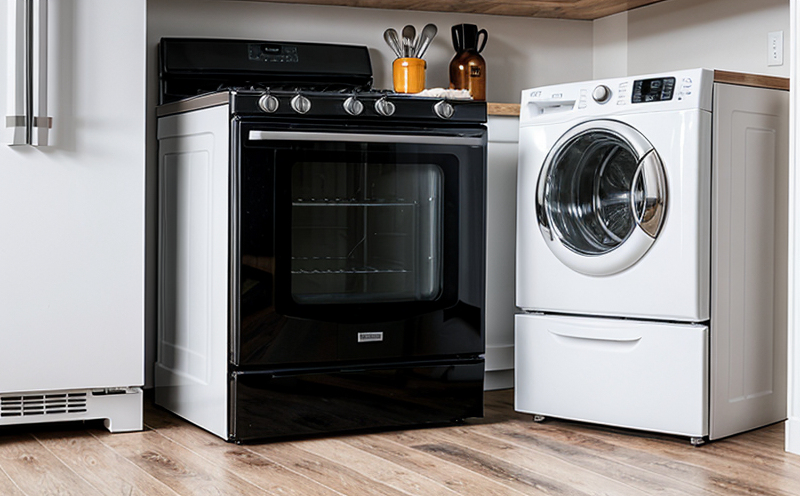Connectivity Testing of Smart Household Appliances
In today's interconnected world, smart household appliances have become an integral part of everyday life. These devices offer enhanced convenience and efficiency, but they also come with new challenges in terms of connectivity reliability and security. Connectivity testing is a critical step in ensuring that these devices perform as expected across various networks and platforms.
The purpose of connectivity testing is to verify the smooth operation of smart appliances when communicating over different networks such as Wi-Fi, Bluetooth, Zigbee, or Z-Wave. This ensures seamless integration with home automation systems and other compatible devices. The goal is not only to check if the device can communicate but also to ensure that data transfer rates are optimal, security protocols are robust, and the overall user experience is positive.
Testing involves several stages: initial setup, network connection validation, performance under different conditions (including low signal strength), compatibility checks with various smart home platforms, and security vulnerability assessments. During these tests, we use industry-standard tools like Wireshark for packet analysis and ZTest for Zigbee/Z-Wave compliance.
One of the primary challenges in connectivity testing is ensuring that all components work together harmoniously under real-world conditions. This includes simulating different network environments, which can vary greatly depending on geographical location, infrastructure type, and time of day. Another challenge lies in keeping up with rapid technological advancements; new protocols are constantly emerging, requiring continuous adaptation of test procedures.
Accurate testing is crucial for manufacturers who aim to meet regulatory requirements while delivering products that satisfy consumer expectations. By identifying potential issues early on, companies can improve product quality and reduce post-launch defects, ultimately leading to higher customer satisfaction and brand loyalty.
At our laboratory, we employ a team of experienced engineers specializing in electronic engineering and computer science. They utilize advanced equipment such as network analyzers, signal generators, and software-defined radios (SDRs) to conduct rigorous tests that mimic actual user scenarios. Our approach ensures comprehensive evaluation covering all aspects related to connectivity performance.
The importance of thorough testing cannot be overstated; it plays a pivotal role in maintaining public safety by preventing accidents caused by faulty connections or unauthorized access attempts. Moreover, successful completion of these tests helps manufacturers comply with relevant international standards like ISO/IEC 27001 for information security management systems and IEC 62582-10 for wireless communication interfaces.
By investing in comprehensive connectivity testing services, businesses demonstrate their commitment to innovation and safety. This not only enhances product reliability but also builds trust among consumers who are increasingly concerned about privacy and data protection issues associated with connected devices.
Environmental and Sustainability Contributions
The process of testing smart household appliances for connectivity can have positive implications on both the environment and sustainability efforts. By ensuring that these devices operate efficiently within their networks, we contribute to reducing energy consumption and minimizing waste generation.
Smart appliances equipped with advanced sensors and connectivity features allow users to monitor and control usage patterns more effectively. For example, a connected thermostat helps regulate heating or cooling systems based on occupancy levels, thereby conserving electricity without compromising comfort. Similarly, automated washing machines can optimize water and detergent usage according to load size and fabric type.
Testing plays an essential role in promoting resource efficiency by identifying inefficiencies early during development stages. Manufacturers can then implement improvements that lead to reduced operational costs and lower environmental impact over time. Additionally, robust security measures implemented through thorough testing prevent unauthorized access attempts which could potentially cause damage or misuse of resources.
Our laboratory adheres strictly to ISO 14001:2015 standards for environmental management systems, ensuring that our operations are conducted responsibly and sustainably. We strive to minimize waste production by recycling materials wherever possible and adopting energy-efficient practices throughout our facilities.
Competitive Advantage and Market Impact
In today's competitive market landscape, having reliable connectivity testing capabilities can provide significant advantages for businesses operating in the consumer products sector. Companies that invest in this service gain valuable insights into their product performance under various conditions, allowing them to make informed decisions regarding design improvements and feature additions.
One key benefit is improved customer satisfaction. By delivering products that consistently meet high standards of connectivity reliability and security, manufacturers can enhance brand reputation and foster long-term relationships with satisfied customers. This positive feedback loop often translates into increased market share and loyalty among users who appreciate the value proposition offered by these smart devices.
From a regulatory perspective, compliance with relevant international standards like IEC 62582-10 ensures that products are safe for use across different markets worldwide. Adherence to such guidelines not only facilitates easier entry into foreign jurisdictions but also protects against legal repercussions due to non-compliance issues.
The ability to offer comprehensive connectivity testing services positions companies as industry leaders in innovation and safety, attracting potential partners and investors looking for reliable solutions. Furthermore, this expertise can be leveraged to develop new offerings tailored specifically towards meeting evolving consumer demands related to smart home technologies.
Use Cases and Application Examples
The application of connectivity testing in the realm of smart household appliances is vast and varied. Below are some illustrative examples highlighting its significance across different scenarios:
- Smart Thermostats: Ensuring seamless communication between thermostats and mobile apps allows users to control room temperatures remotely, optimize energy consumption, and enhance overall comfort.
- Washing Machines: Testing the connectivity of washing machines ensures they can connect to smart laundry services, providing notifications about completed cycles or suggesting optimal settings for specific loads.
- Dishwashers: Connectivity testing helps verify that dishwashers integrate effectively with home automation systems, enabling users to schedule cleaning tasks and monitor water usage.
- Cooking Appliances: Ensuring reliable connectivity between cooking appliances and recipe platforms allows for personalized meal preparation experiences tailored to individual preferences.
In each case, thorough testing ensures that devices function correctly within their intended networks, enhancing user experience while maintaining high levels of security and privacy protection.





